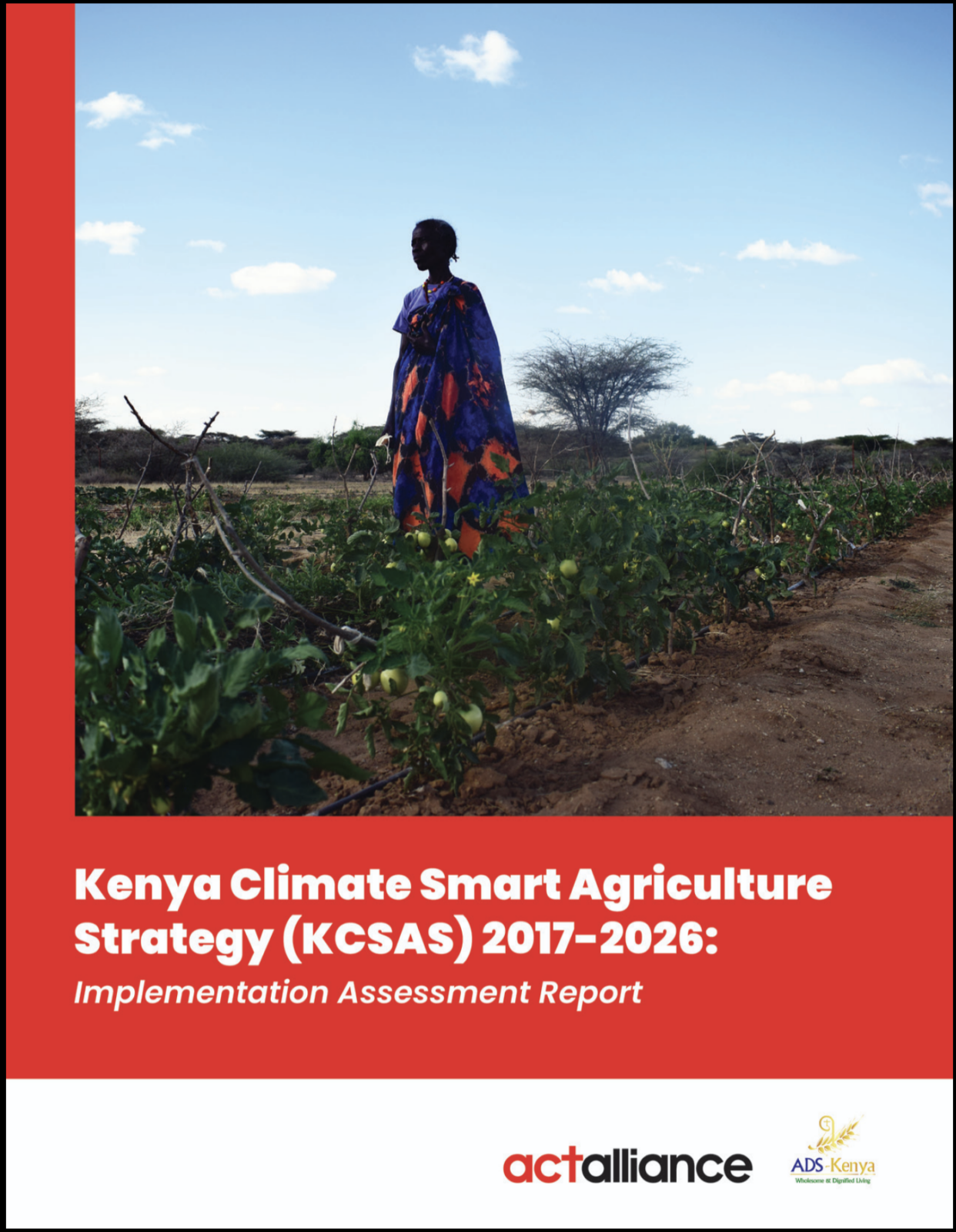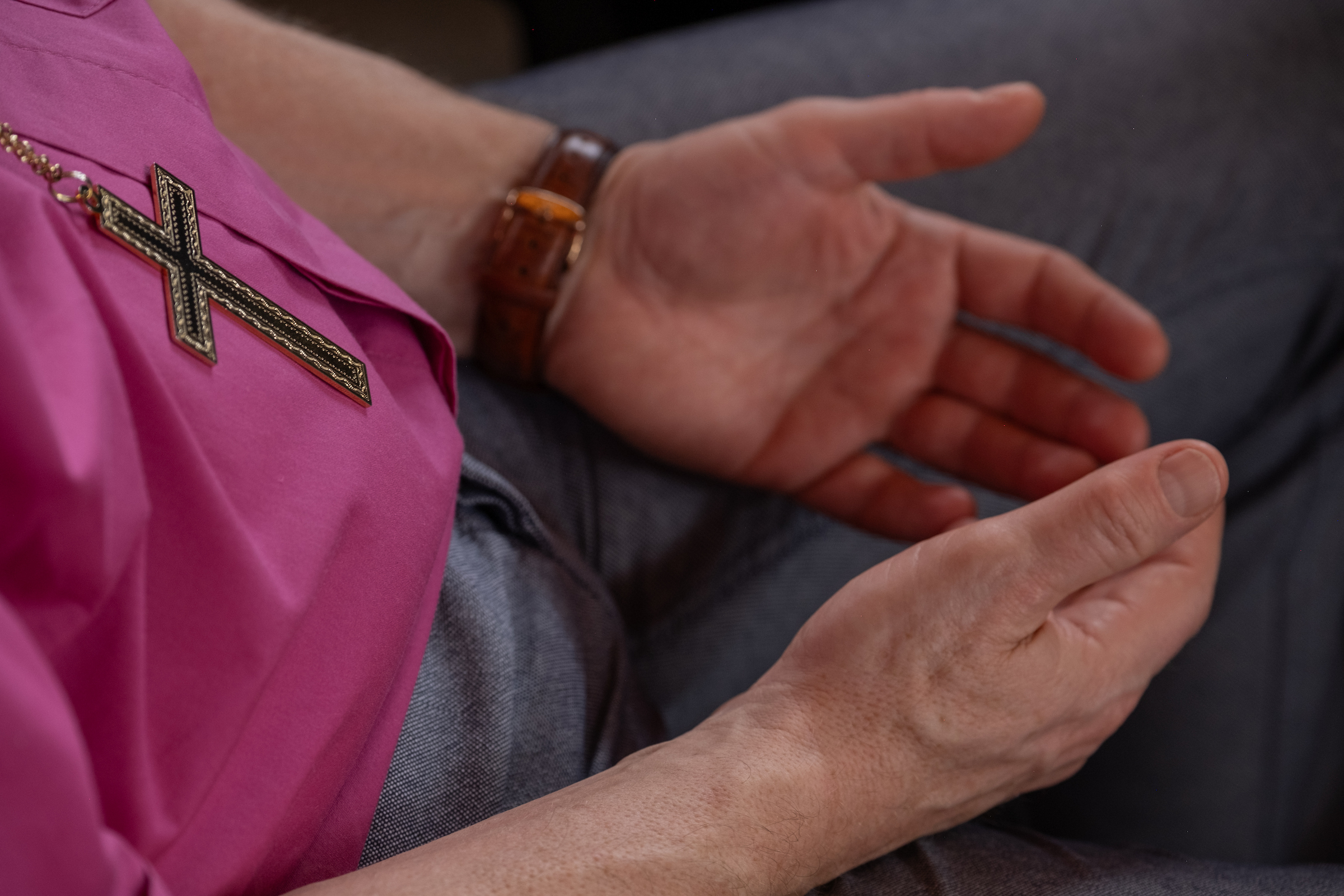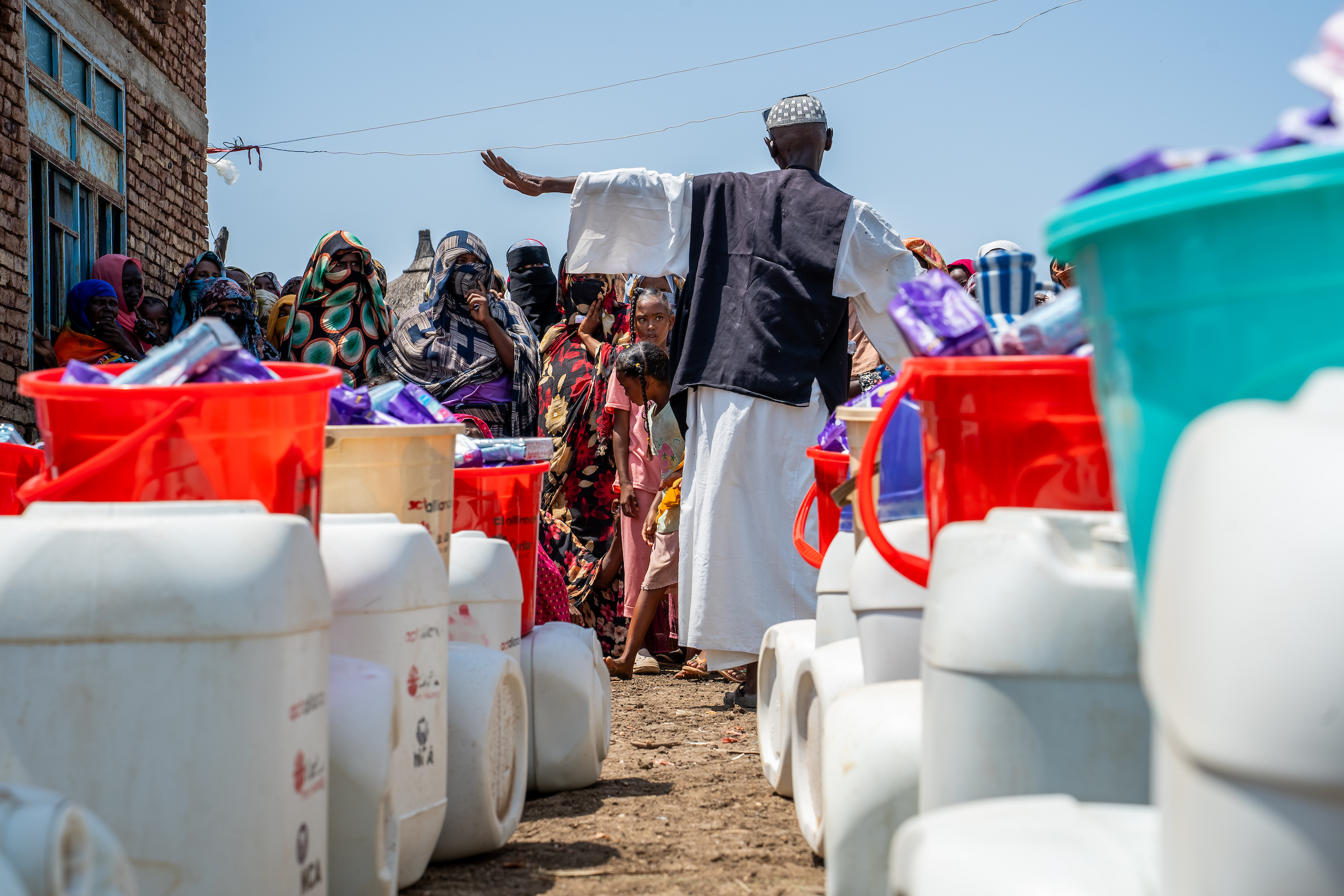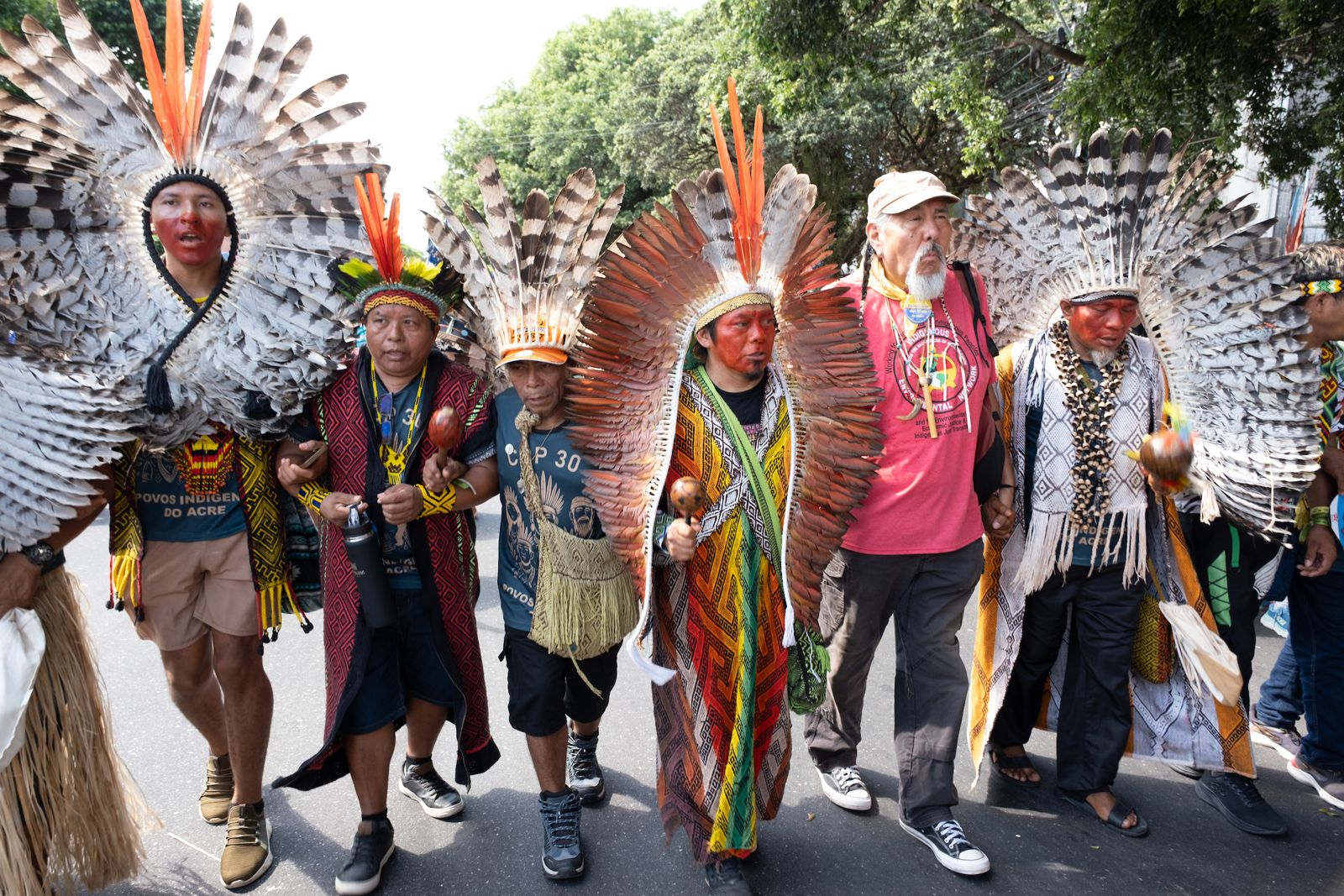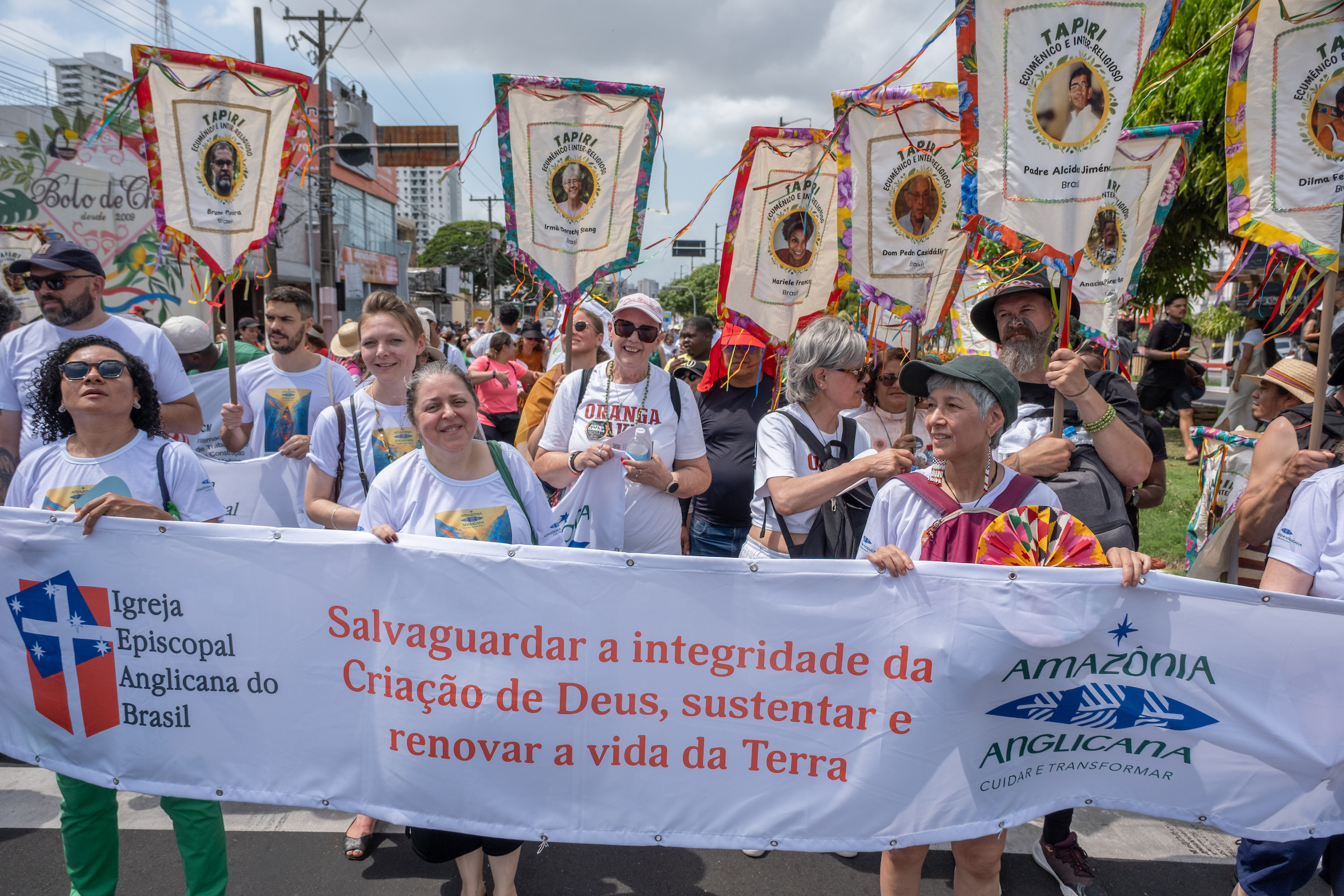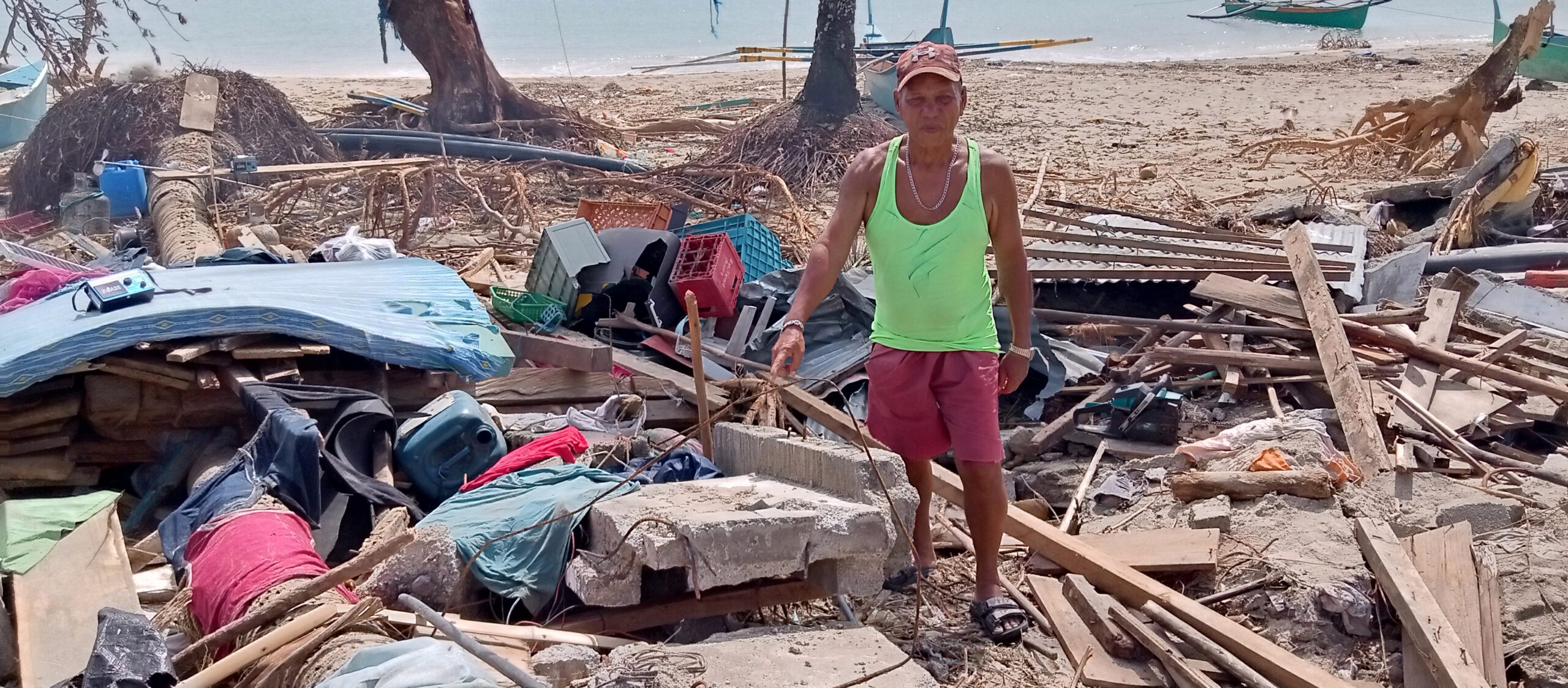After two weeks of intense negotiations in the midst of the Brazilian Amazon, COP30 drew to a close on Saturday, and the results were mixed. Gains were made in adaptation and in gender, but other key topics like responding to climate-induced losses and damages did not fare as well.
The Brazilian COP was called both the “COP of Truth” and the “People’s COP” and the strong presence of civil society at the People’s Summit (hosted by over 1200 organisations and communities in the first week of COP) and the Tapiri gathering of faith actors in and around the Anglican Cathedral in Belem, as well as a strong and visible presence of Indigenous people from the Amazon region around COP- although not many inside- were signs of the difference it made to have COP hosted in Brazil in 2025.
Brazil also introduced the concept of a Global Ethical Stocktake to look not just at the scientific and economic realities of climate change, but also the ethical and moral dimensions of the climate emergency.
ACT Alliance, the Lutheran World Federation, and the World Council of Churches were active before and during COP30, advocating, speaking, praying, networking, marching, and working to hold negotiators and Parties to account, so that the results of the COP reflect climate justice as strongly as possible. The ecumenical delegation joined other faith groups in the work of the Interfaith Liaison Committee to the UNFCCC in a Talanoa conversation at the beginning of COP to hear from people of faith their ethical concerns and suggestions, in holding press conferences, and in exploring how faith actors can deepen their engagement and effectiveness at COP.
The ecumenical delegation also followed many of the negotiation streams at COP, and the comments below reflect the impressions of a wide range of the members of the ecumenical delegation.
The new finance target for adaptation must not become a reason for international complacency. The existing finance mechanism must continue to flow and be delivered to help vulnerable communities affected by the impact of climate change.Irene Anene ACT Uganda Forum Coordinator
Adaptation
Irene Anena, ACT Uganda Forum coordinator: “It was exciting to see adaptation at the heart of COP30. With the progress in the Belem outcome package of tripling Adaptation finance by 2035 which will help create a balance between adaptation and mitigation but also for the progress on the Global Goal on Adaptation with the 59 indicators gavelled through. We hope the proposed way forward for addressing these concerns on the GGA will be top of the agenda at the SB June Bonn session. This means a lot of work and calls for cooperation and commitment from parties
“Certainly 2035 is a whole decade and the climate crisis continues to persist. Therefore the new finance target for adaptation must not become a reason for international complacency. The existing finance mechanism must continue to flow and be delivered to help vulnerable communities affected by the impact of climate change.”
Wiebke Zimmermann, Evangelical-Lutheran Church of Hanover, Germany; Lutheran World Federation: “Regarding the Global Goal on Adaptation, a clear outcome on increasing finance is missing. There was a decision in tripling adaptation finance but without mentioning a baseline. As climate impacts worsen this does not live up to urgent funding needs of countries and local communities in the Global South. So much harm has already been done to our planet, now we must enable people to adapt to the changing climate.”
Finance
Julius Mbatia, global climate justice programme manager with ACT Alliance: “Termed as a COP of truth and implementation, COP 30 has affirmed that there cannot be action without support. Determined to adjust the course, the deliberations have launched possibilities to discuss the centrality of public finance in addressing the climate challenges of vulnerable nations in a context where a mention of public finance has slowly been suppressed.
“The tension between provision and mobilization of finance continues to cloud debates on finance, while emphasis on what is fair, just, and needed action by developed countries to provide finance was watered down by counter debates on global effort that implies even vulnerable nations must foot the climate bill. With this contestation, future work launched at COP 30 to advance exchanges on the matter demonstrates just how much more the core of what we advance- justice and responsibility- is urgently needed.”
The [Gender Action Plan] ensures that the human rights of women, Indigenous peoples, youth, persons with disabilities, and other groups on the frontlines of crises and emergencies are upheld. These groups must have a voice to share their lived experiences of climate change and a seat at decision-making tablesMargareta Koltai Policy Advisor, Act Church of Sweden
Gender
Margareta Koltai, Policy Advisor, Act Church of Sweden: “I am proud and it gives me motivation to belong to a global faith community. Our values are not defined by nationality or national interests; they are rooted in justice and the dignity of life for all. These values are providing important guidance on why the negotiations on the Gender Action Plan (GAP) at COP30 should be at the heart of climate decisions and actions. The GAP ensures that the human rights of women, Indigenous peoples, youth, persons with disabilities, and other groups on the frontlines of crises and emergencies are upheld. These groups must have a voice to share their lived experiences of climate change and a seat at decision-making tables. This is important to ensure that their needs are addressed, and their solutions enabled and financed.
“The process of developing the GAP has been long and inclusive. It has been one of the few negotiation spaces where civil society and diverse caucus groups were welcomed and invited to participate. The ownership of the proposed actions is deeply rooted in processes that took place during the SB sessions in Bonn, the African Climate Week in Addis Ababa, and other meetings throughout the year. One major issue remains: ensuring the means of implementation. This is a legitimate demand from developing countries. It is not enough to only agree to the plan, it is equally important to have the resources to act on it.
“I also express serious concern about parties who added brackets and footnotes to the text. We urge these parties to reconsider and respect the inclusive process behind the GAP and it is important to highlight that even when they refer to faith and beliefs they do not represent all people of faith. Unfortunately, these changes resulted in a text that does not clearly reflect human rights, removed references to the SDGs, and questioned the concept of gender intersectionality by reducing equity to something tied only to biological sex. This is a significant limitation to equality and undermines efforts to ensure human rights for all within the climate space.
“Nevertheless, even with watered-down language, the actions remain thanks to the hard work of parties and civil society actors who joined forces to affirm that without gender justice, there can be no climate justice. Now we have a GAP in place. The time has come to make it work!
The failure of COP 30 to commit to a phase-out of fossil fuels and the elimination of inefficient subsidies signals a lack of true commitment to achieving the Paris Agreement’s 1.5 degree target. Moreover, neglecting to address the equitable, sustainable, and inclusive sourcing and management of critical minerals in the COP decision risks perpetuating the very dangers we aim to overcome, potentially leaving vulnerable communities behind on the path to a cleaner future.Jacqueline Kimeu Energy Advisor, Christian Aid
Just Transition
Elena Cedillo, Program Executive for Climate Justice, Lutheran World Federation: “We have come together at COP30 in Belem with a shared purpose: to ensure that the transition to a low-carbon, climate-resilient future is truly just and leaves no one behind. As countries need to accelerate climate action, we must not allow these transformations to deepen inequalities or burden those already most at risk. Faith-based organizations remind us that climate impacts are not only scientific or economic, they are profoundly moral. We call on governments to uphold human dignity, protect the vulnerable and ensure that every policy is grounded in compassion, justice and inclusion. A just transition is not just a technical change to energy systems, but a comprehensive transformation grounded in equity, participation, and human rights. We bring diverse voices, lived experience and collective advocacy to the global conversation, reminding the world that a transition can only be considered just if it delivers justice”
Jacqueline Kimeu, Energy Advisor, Christian Aid: “Just transition is not a fancy word but a reality with real-life consequences for both people and the planet. The failure of COP 30 to commit to a phase-out of fossil fuels and the elimination of inefficient subsidies signals a lack of true commitment to achieving the Paris Agreement’s 1.5 degree target. Moreover, neglecting to address the equitable, sustainable, and inclusive sourcing and management of critical minerals in the COP decision risks perpetuating the very dangers we aim to overcome, potentially leaving vulnerable communities behind on the path to a cleaner future.”
Climate-Related Migration, Displacement and Planned Relocation
Dr. Katherine Braun, policy Adviser climate índuced displacement and human rights, Lutheran Church of Northern Germany and chair of the ACT Migration & Displacement Reference Group: “Despite sharp increases in climate-related displacement (with 75% now occurring in fragile and conflict-affected settings), negotiators removed or weakened mobility-related language across major decisions. This undermines earlier progress under the Warsaw International Mechanism (WIM) and disregards emerging international law, including the ICJ Advisory Opinion (2025).
“COP30 represents a major step backward for people already moving—or forced to move—due to climate impacts. To avoid growing protection gaps, the next negotiating cycle must re-center mobility, human rights and legal obligations established by the ICJ. Only then can climate governance provide safety, dignity and justice for people on the move.”
As young people, we have come here with hope — hope that these negotiations will finally deliver the answers the world urgently needs in this time of environmental and climate emergency, driven largely by the actions of the most powerful.Carine Josiéle Wendland LWF delegate to COP30 from the Evangelical Church of the Lutheran Confession in Brazil
Climate-Related Migration, Displacement and Planned Relocation
Dr. Katherine Braun, policy Adviser climate índuced displacement and human rights, Lutheran Church of Northern Germany and chair of the ACT Migration & Displacement Reference Group: “Despite sharp increases in climate-related displacement (with 75% now occurring in fragile and conflict-affected settings), negotiators removed or weakened mobility-related language across major decisions. This undermines earlier progress under the Warsaw International Mechanism (WIM) and disregards emerging international law, including the ICJ Advisory Opinion (2025).
“COP30 represents a major step backward for people already moving—or forced to move—due to climate impacts. To avoid growing protection gaps, the next negotiating cycle must re-center mobility, human rights and legal obligations established by the ICJ. Only then can climate governance provide safety, dignity and justice for people on the move.”
Loss & Damage
Kriity Shresta, Climate Advisor, DanChurchAid: “The COP30 decision marks good operational progress for the FRLD — Barbados Implementation Mechanism (BIM) proposed, funding requests have been called, and the Fund is moving from setup to delivery- in a bottom up, country led, inclusive manner. That is a concrete and important step toward addressing loss & damage.
“However the text also exposes urgent shortcomings: insufficient clarity on total funding , delayed resource-mobilization strategy, a 2027 replenishment start, and several critical operational modalities left to be developed. These gaps risk slowing down delivery to vulnerable countries and communities unless Parties push for firm targets, faster interim finance, and immediate adoption of rapid-disbursement and small-grants rules.”
Youth
Carine Josiéle Wendland, LWF delegate to COP30 from the Evangelical Church of the Lutheran Confession in Brazil: “As young people, we have come here with hope — hope that these negotiations will finally deliver the answers the world urgently needs in this time of environmental and climate emergency, driven largely by the actions of the most powerful. We stand for intergenerational justice, where the voices of both the young and the most vulnerable are truly heard. We call for responses that restore dignity, regenerate life and protect all communities facing the realities of the climate emergency.”
Ocean
Blair Nelsen, Executive Director of Waterspirit, UN Representative for the Congregation of the Sisters of St. Joseph of Peace: “At the third UN Ocean Conference in Nice, France, in June 2025, Brazil’s President Lula pledged to make COP30 the COP of the Ocean, encouraging countries to join the Blue NDC challenge by incorporating blue carbon pledges into their climate goals. While ocean-focused activities flourished at COP30– including an in-person and virtual Ocean Pavilion, an Ocean Day, and a “Voices of the Ocean” house offsite– as the conference drew toward a close, only 17 countries had taken up the invitation to join the Blue NDC challenge. Drawing adequate attention to the ocean-climate-biodiversity nexus will be crucial as we move into 2026, when the High Seas Treaty will enter into force and the first Ocean COP will be held. It will also be important for people of faith to spread the message that the climate negotiations and the international plastics treaty talks are stalled for the same reason: the same bad faith actors from the fossil fuel industry are dominating both conversations. Remembering the ocean’s role in creating a liveable world will be a key factor in ensuring a liveable future. In addition to increasing attention to the possible synergies between ocean-climate-biodiversity commitments across UN mechanisms, parties would benefit from experiencing an ecological conversion that focuses on water, pulling awareness of water as the key to our interdependence and mutual flourishing down from their heads to their hearts. For many of the world’s peoples, ‘ocean’ is subject, not object, and that cosmovision must be honored and incorporated into the UN’s way of doing business.”
Final comments
Gonzalo Millán, Program Professional, Servicio Evangélico de Diaconia -SEDi-, ACT Alliance Argentina Forum: “COP30 exposes an intolerable divide: while technical language turns the climate crisis into a business opportunity, the peoples most affected —and least responsible— cry out for what truly matters: our shared survival. Our responses must be sensitive to the voices of women, children, Indigenous peoples, traditional and rural communities, and the working class. Solutions must be shaped by the realities and needs of the peoples themselves. We can no longer accept that crises are transformed into opportunities for profit. It is time to act with courage and faith. To listen to the communities who resist, to assume our part, to place life above political calculations. The future is being decided now, and humanity no longer has the luxury of indifference.”
Marijke Van Duin, COP 30 observer for the World Council of Churches: “There can be no (COP of) truth without a reality check. Developed world: take up your responsibility and provide climate finance! You can avert the worst for the global South.”

